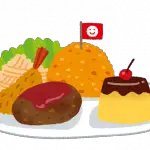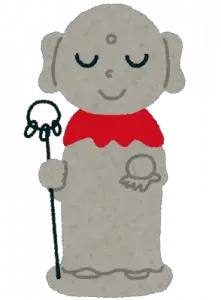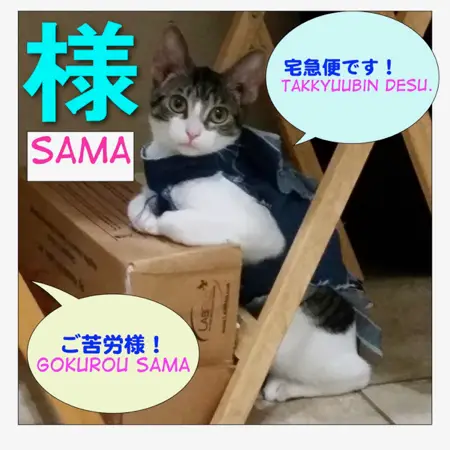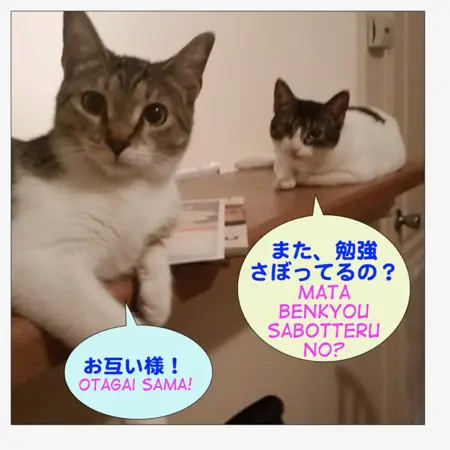「宅急便です。」
= Takkyuubin desu.
= Delivery service.
「ご苦労様」
= Gokurou sama.
= Thank you (for your work ) .
Zelda:「また、勉強さぼってるの?」
= Mata, benkyou sabotteru no?
= Are you slacking off in your studies again?
Nayru:「お互い様」
= Otagai sama
= Looks who’s talking.
Hi everyone!
We just got new Team Maggie members, Zelda Sensei and Nayru Sensei.
They are going to teach you the word 様 ( = sama).
You might think yo yourself, “I know that! That’s the polite way to say さん ( = san), right?”
Yes, that’s right. But there is more to it!
*****
こんにちは!= Konnichiwa! はじめまして = Hajimemashite = Nice to meet you!
We are your guest teachers, Zelda and Naryu.
Today’s lesson is about 様 ( = さま= sama)
I will teach you when to use 様 ( = さま= sama) along with lots of expressions with 様 ( = さま= sama)
★ name + 様 ( = sama)
As many of you know, you address other people with さん ( = san) / ちゃん ( = chan) (for children/ girls/ women) / 君 ( = kun) (for boys/men)
If you want to address someone in a polite way,
→family name + 様 ( = sama)
Note: 様 ( = さま = sama) and さん ( = san )are gender neutral and can be used for men and women.
* 田中様 = Tanaka sama = Mr./Ms. Tanaka
* 鈴木様 = Suzuki sama = Mr./Ms. Suzuki
Ex. 鈴木様がお待ちです。
= Suzuki sama ga omachi desu.
= Mr./Ms. Suzuki is waiting for you.
Ex. 村上様よりお電話がありました。(formal/business)
= Murakami sama yori odenwa ga arimashita.
= Mr./Ms. Murakami called you.
Even if you usually address someone as さん ( = san) , ちゃん ( = chan) / 君 ( = kun) or even without any of them (called 呼び捨て( = yobisute)), if you write their name on an envelope or postcard, you use 様 ( = sama).
* 加藤一郎様*
= かとういちろうさま
= Katou Ichirou sama
= Mr. Ichiro Kato
(* When you write a full name in Japanese, you start with one’s family name)
You also use 様 ( = sama) when you address a customer at a store, postoffice, bank, hotel, restaurant, etc.
Ex. 川口様、お待たせいたしました。
= Kawaguchi sama, omatase itashimashita.
= Sorry to have kept you waiting, Mr./Ms. Kawaguchi.
★Address super stars who you love/worship with 様 ( = sama)
Sometimes a fan (especially women) add ( = sama) when referring to their favorite celebrity / idol /super star, etc.
These examples are fairly old but,
a Korean actor, ペ・ヨンジュン (Bae Yong Joon) became very popular among middle aged women in Japan and he was called,
→ヨン様 ( = Yon sama)
レオナルド・ディカプリオ ( Leonardo DiCaprio)used to be called レオ様 ( = Reo sama)
So the fans address their idols (usually which someone with charisma) as 様 ( = sama)
Ex. ガガ様 = GAGA sama = Ms. Gaga
★Showing your respect in business/formal situation.
Besides someone’s name, you attach 様 ( = sama) when you address someone/ a group of people to show your respect in business/formal situation.
* お客様
= okyaku sama
= polite way to refer to a customer/client
Ex. 10番でお待ちのお客様
= Juuban de omachi no okyaku sama
= (literal meaning) A customer who has been waiting with a number 10.
* お子様 = おこさま = okosama = child / children
Ex. お子様をお連れのお客様はご搭乗ください。
= Okosama wo otsure no okyakusama wa gotoujou kudasai.
= We are inviting passengers who are with small children to board.
A lot of family restaurants serve kids lunch called お子様ランチ ( = okosama ranchi)

* 皆様 = みなさま = minasama = everybody
Ex. ご家族の皆様によろしくお伝えください。
= Gokazoku no minasama ni yoroshiku otsutae kudasai.
= Please say hello to everyone in your family.
Note: A lot of Japanese learners say みんな様 ( = minnasama ) but it is みなさま ( = minasama)
You don’t attach 様 ( = sama ) to みんな ( = minna) which is more casual way to say “everyone”
* number + person + 様 ( =sama) / Who
* お一人様 = おひとりさま = ohitorisama = one person
* 一名様 = いちめいさま= ichimeisama = one person
* 何名様 = なんめいさま = nanmei sama = How many people (in your group)?
at the entrance of a restaurant,
Ex. Waiter:「何名様でしょうか?」
= Namei sama de shou ka?
= For how many people?
Customer:「二人です。」
= Futari desu.
= For two.
* どちら様 =どちらさま= dochirasama = who
(Answering the phone.)
Ex. どちら様でしょうか?
= Dochira sama deshou ka?
= Who is it?
★ family
When you refer to other people’s family politely
* お父様 = おとうさま= otousama = someone’s father
* お母様 = おかあさま = okaasama = someone’s mother
* お兄様 = おにいさま = oniisama = someone’s older brother
* お姉様 = おねえさま = oneesama = someone’s older sister
* 奥様 = おくさま= okusama = someone’s wife
* ご主人様 = ごしゅじんさま = goshujin sama = someone’s husband
* ご子息様 = ごしそくさま= goshisoku sama = someone’s son
* お嬢様 = おじょうさま= ojousama = someone’s daughter / lady /refers to a girl who was raised in a wealthy family (Sometimes it is used sarcastically “a spoiled rich girl”
Note: The equivalent male word is お坊ちゃん ( = obocchan) / お坊ちゃま ( = obocchama)
*ご先祖様 = ごせんぞさま= gosenzo sama = one’s ancestors.
★to express one’s respect or feeling of awe
1) God / noble people such as lords, royal families and so on.
* 神様 = かみさま= kamisama = God
* 氏神様 = うじがみさま= ujigami sama = Local Shinto shrine deity
* 仏様 = ほとけさま= hotoke sama = Buddha
* お地蔵様 = おじぞうさま= ojizousama = guardian deity of chil

2) royal family/ high ranking people
* 王様 = おおさま = oosama = king
* 女王様 = じょおうさま(じょうおうさま) = joousama ( jouousama) = queen
* 王子様= おうじさま = oujisama = prince
* お姫様= おひめさま= ohimesama = princess
* (お)殿様 = (お) とのさま = (o) tonosama = a feudal lord in Japan
3) the moon/sun/ thunder
It sounds more friendlier to say with お~様 ( = o ~ sama )
(Especially when you talk to children)
* お月様 = おつきさま= otsukisama = the moon
* お星様 = おほしさま= ohoshisama = the stars
* お日様 = おひさま= ohisama = the sun
* お天道様 =おてんとうさま = otentousama (or おてんと様= otento sama) the sun (* A little old fashioned)
* 雷様 = かみなりさま= kaminari sama = thunder
★ Negative/vulgar usage
*何様 = なにさま = nani sama
Ex. 何様だと思っているの?
= Nani sama dato omotte iru no?
= Who do you think you are?
* 貴様 = きさま = kisama (blunt/strong/male speech)
Now, the kanji 貴 is read き( = ki) / 貴い ( = たっとい= tattoi) 貴い ( = とうとい = toutoi) which means “noble” / “esteem”
So you might naturally think 貴様 ( = kisama) is an honorific expression. It was so long time ago but now it is a very strong insulting word for “you”.
(When you are angry to someone)
「貴様!」(vulgar/strong/male speech)
= Kisama!
= You son of a bxxx!
* 俺様 = おれさま = oresama (when you refer to yourself/male speech)
It is a very arrogant way to refer to yourself.
「俺様の言うことがわからないのか。」 (vulgar/strong/male speech)
= Oresama no iu koto ga wakaranai no ka.
= Don’t you understand what I’m saying?!
Note: I don’t think you will ever use 貴様 ( = kisama) and 俺様( = oresama) but you may hear/see them in comic books/ anime or TV dramas or movies.
* Sarcastic usage:
* お偉い様
= Oerai sama
= big shot
You also say お偉いさん ( = Oeraisan) higher-up
Ex. お偉い様のいうことには従わないと。
= Oerai sama no iu koto ni wa shitagawa naito.
= I have to follow what my GREAT higher-up says.
* to refer to someone who behaves selfish way/arrogantly/ like a king or queen.
For example, a girl whose name is Mariko behaves like a queen or is bossy,
Ex. マリコ様のご機嫌がまた悪い。
= Mariko sama no gokigen ga mata warui.
= Queen Mariko is in a bad mood again.
★Expressions with 様 ( = sama)
Some of the following expressions with 様 ( = sama) are VERY Japanese and there is no simple English equivalent translation and changes the meaning depending on the context so I will show you when you say them with these example sentences.
*お疲れ様 = おつかれさま = Otsukare sama
(more casual お疲れさん= おつかれさん= Otsukare san)
= (Literal meaning) Thank you for your hard work. / You must be tired after your hard work.
It is an expression that you want to tell that person that you are aware that they have worked hard or did a nice job.
But a lot of time, you just say that instead of saying good-bye.
For example someone leaves the office before you do, they say,
Ex. お先に失礼します。
= Osaki ni shitsurei shimasu.
= (Literal meaning) Allow me to leave here while you are still working.
= (I’m done for today. Bye / See you tomorrow, etc.)
You can tell that person,
Ex. お疲れ様でした。
= Otsukare sama deshita.
= Thank you for working hard/ Or simply Good-bye (See you tomorrow/next week)
If someone works for you / gives you some service, such as delivering packages, carpenters, plumbers fixing something at your house, etc, you tell them
*ご苦労様 = ごくろうさま = Gokurou sama
(more casual ご苦労さん= ごくろうさん= gokurousan)
= (Literal meaning) Thank you for your hard work
Note: *You don’t sayご苦労様 ( = gokurousama) to someone superior to you.
* お互い様 = おたがいさま = Otagai sama
= Likewise / Right back at you / Same here / You, too!/ Something mutual
Ex. 困った時はお互い様。
= Komatta toki wa otagai sama.
= It is natural to help each other when we are in trouble. / We are supposed to help each other.
Ex. 大変なのはお互い様だ。
= Taihen nano wa otagai sama da.
= We are both going through the hard time. (You are not alone. / You are not the only one who is having a difficult time.)
Ex. A:「また新しいコンピューター買ったの?本当に無駄遣いなんだから」
= Mata atarashii konnpyuutaa katta no? Hontou ni mudazukai nandakara.
= You bought a new computer again? You really are wasting your money, aren’t you?
B:「お互い様だよ。この間、新車を買ったんだろ。」(male speech)
= Otagai sama dayo. Kono aida shinsha wo kattan daro.
= Look who’s talking. I heard you bought a new car the other day.
* ご馳走様 = ごちそうさま = Gochisou sama
You say that after you finish eating a meal to show your appreciation for the meal.
when someone treats you
After meal at a restaurant
Ex. A:「今日は僕がおごるから(払わなくて)いいよ。」
= Kyou wa boku ga ogoru kara (harawanakute) iiyo.
= It’s on me today so you don’t have to pay.
B:「ご馳走様!」
= Gochisousama!
= Thank you for treating me.
To say thank you to someone who gave you something to eat.
この間は、おいしいケーキをご馳走様でした。
= Kono aida wa oishii keeki wo gochisou sama deshita.
= Thank you for the delicious cake the other day.
* ご愁傷様 = ごしゅうしょうさま = Goshuushou sama.
= My condolences.
To a person who lost one’s family at a funeral or awake:
Ex. この度はご愁傷様です。
= Kono tabi wa goshuuchou sama desu.
= My condolences.
* お待ちどう様 = おまちどうさま = omachidou sama (casual)
= Thank you for waiting. / I am sorry to have kept you waiting.
When you are late, you tell someone who has been waiting for you.
![]() more polite: お待たせしました ( = omatase shimashita) /(more polite) お待たせいたいたしました。( = omatase itashimashita)
more polite: お待たせしました ( = omatase shimashita) /(more polite) お待たせいたいたしました。( = omatase itashimashita)
/ When you apologize: お待たせして申し訳ありません。( = omatase shite moushiwake arimasen.)
* お気の毒様 = おきのどくさま = Okinodoku sama
= I am sorry to hear that. / I am sorry for someone/ What a shame
To show your sympathy to someone.
It is OK to use it when you talk about a third person but you may want to avoid using it when talking directly to someone because some people may think you are kind of looking down on them as in, “I pity you.” in English.
It is often used sarcastically.
A:「今日はついてないな。」
= Kyou wa tsuite naina.
= It is not my day today.
B:「どうしたの?」
= Doushita no?
= What happened?
A:「彼女に振られた。」
= Kanojo ni furareta.
= She broke up on me.
B:「それはお気の毒様」
= Sore wa okinodoku sama.
= That’s too bad for you.
* お生憎様 = おあいにくさま = oainiku sama
= That’s too bad (Sometimes you say that sarcastically: Sorry to disappoint you but ~ / Sorry I can’t meet your expectations.)
Ex. A man: 「えっ?僕に会いに来たの?」
= Eh? Boku ni aini kite kuretano?
= What? Did you come to see me?
A woman: 「お生憎様。友達に会いに来たの。」
= Oainiku sama. Tomodachi ni aini kitano.
= Sorry to disappoint you. I came here to meet my friend.
* お粗末様 = おそまつさま = osomatsu sama
The literal meaning is “poor quality of food”
A person who makes a meal says this after someone says ご馳走様 ( = gochisousama) Thank you for the meal, in a humble way.
「ご馳走様でした。」
= Gochisou sama deshita.
= Thank you for the delicious meal.
「お粗末様でした。」
= Osomatsu sama deshita.
= It was nothing special.
* おかげ様(お陰様/お蔭様)で= おかげさまで= okagesama de = thanks to you
Ex. 「おかげ様で試験に受かりました。」
= Okagesama de shiken ni ukarimashtia.
= Thanks to you, I passed the exam.
You also say that to a person who has nothing to do with that matter.
Ex.「お元気でしたか?」
= Ogenki deshitaka?
= How have you been?
「はい、おかげ様で」
= Hai, okagesama de.
= Yes, I’ve been good. Thank you.
Ex.A:「お怪我はもう治りましたか?」
= Okega wa mou naorimashita ka?
= Has your injury healed yet?
B:「はい、おかげ様ですっかり治りました。」
= Hai, okagesama de sukkari naorimashita.
= Yes, thank you. It has healed completely.
****
Extra!
This is just an expression but let me add one more.
*午前様 = ごぜんさま= gozensama = to stay out after midnight
Ex. 今日も仕事で午前様だ。
= Kyou mo shigoto de gozensama da.
= I got home past midnight for work again
****
Zelda 先生、Nayru 先生、お疲れ様!
= Zelda Sensei, Nayru Sensei, otsukare sama!
= Thank you for your work, Zelda Sensei and Nayru Sensei.
****
 マギー先生より = Maggie sensei yori = From Maggie Sensei
マギー先生より = Maggie sensei yori = From Maggie Sensei
おかげ様でこのサイトも10年を迎えることができました。
= Okagesama de kono saito mo juunen wo mukaeru koto ga dekimashita.
= Thanks to you, it has been 10 years since we started this site.
正直言って、こんなに長い間続くとは想像もしていませんでした。
= Shoujiki itte, konnani nagai aida tsuzuku to wa souzou mo shite imasendeshita.
= Honestly we had never imagined that it would last this long.
これからもがんばって楽しいレッスンをいっぱい作っていきますね。
= Korekara mo ganbatte tanoshii ressun wo ippai tsukutte ikimasune.
= We will keep making more and more fun lessons!
***
I REALLY appreciate your support! サポートありがとう! !CHECKHEART!
My supporters can access an audio file for this lesson on my Patreon page and some mini lessons and quiz.
Audio File for this lesson



12 Comments
Hi Maggie,
Hope all is well :)
I saw 鈴木降様 / 鈴木降さん used in my new book today and wondered what the 降 meant.
I’m guessing that it means “The Younger Mr Suzuki” because the writer is talking about attending a memorial service for the deceased 鈴木様, and on arrival he met Mr Suzuki’s eldest son.
Is that correct? I can’t find a reference to using 降 anywhere when referring to people…
Many thanks,
Peter.
Hello Peter
How are you doing?
OK, 隆 is たかし (Takashi). It is one of the common male’s first names.
鈴木= Family name so 鈴木降様 or 鈴木降さん means “Mr. Takashi Suzuki”
Oh ha ha! I feel a bit silly now :D
Thank you so much – it all makes a bit more sense now :)
Problem solved! 😉
Can you also use ojousama to a pretty girl as a compliment/tease? For example if you are giving something to a girl, どうぞ、きれいな髪お嬢様。
Haha
Yes, you can say that “jokingly”
きれいな髪”の”お嬢様
すばらしいレっスンをつかられて、ありがとうございました!
There is a part where you say
“Note: You also use お嬢様 ( = ojousama ) to”..?
and then you stop right there. I’m really curious, is there anything you forgot to put after that “to”?
Thanks again!
Hi Tata
Sorry. I thought I erased the sentence.
I already wrote the note here.
(Sometimes it is used sarcastically, “a spoiled rich girl”
hello Maggie Sensei 😀
詳しく日本語を教えてくれていつもありがとうございます😄😄
質問がありますが、、
how to answer お疲れ様 correctly?
Hi Lee,
Basically you don’t have to say anything but…
If you are working with someone and they tell you お疲れ様, you can also say お疲れ様. You say that almost immediately when someone tells you.
Or you can say
Name (san) こそ、お疲れさ様でした。
Ex. Leeこそお疲れ様! (Between friends)
Ex. Leeさんこそお疲れ様でした。(a little more formal)
If you leave earlier than other people, you say
お先に失礼します。
If you are working and someone shows appreciation for your work, saying お疲れ様です。
You can say something like
いいえ No problem. (This is nothing)
とんでもないです (formal) Not at all
ええと、辞書の定義などでも
「…またはその様」とよく書かれていますね。
こんにちは!
このレッスンでは丁寧な表現の様について説明しましたが、様には他の意味があります。
様子・有様(ありさま)= 物事の状態(じょうたい)を表す言葉です。
I was focusing on the honorific expressions with 様 (さま) in this lesson but
There is other meaning of 様(さま) which means
ありさま・様子(ようす) state/ condition of things/people.